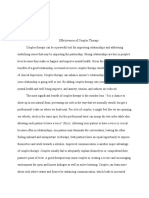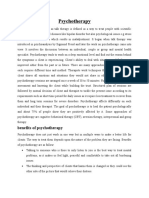Guidance and Counseling
Guidance and Counseling
Uploaded by
mubakyedaniel2000Copyright:
Available Formats
Guidance and Counseling
Guidance and Counseling
Uploaded by
mubakyedaniel2000Original Title
Copyright
Available Formats
Share this document
Did you find this document useful?
Is this content inappropriate?
Copyright:
Available Formats
Guidance and Counseling
Guidance and Counseling
Uploaded by
mubakyedaniel2000Copyright:
Available Formats
What is the meaning of marital guidance?
Marital counselling, which is also called 'marriage counseling' or 'marital therapy',
is a form of counselling for married couples or couples who are engaged and are on
their path of getting married. There is difference between real and ideal life and
sometimes striding for ideal life can lead to conflict
What Is Marriage Counseling?
Marriage counseling is a type of joint counseling in which a couple seeks help, typically
due to relationship issues. It differs from other types of therapy because there are
two married individuals involved in each session.
Marriage counseling is considered by many therapists as the most difficult therapy to
undertake, according to Block, especially with couples who are angry, hurt and treat
the therapy as a medium to prove their partner wrong. “They view the process as a
court and the therapist a judge who will hopefully straighten out their partner,” he
says, stressing that is not the purpose of marriage therapy.
At its core, marriage counseling is meant to help couples understand and resolve
conflicts to improve their relationship. It’s intended to give couples the tools to
communicate with more compassion and less fear while learning how to problem-
solve and deal with conflict in a healthy manner.
You don’t need to be struggling in your relationship to seek marriage counseling. In
fact, you may have a better result if you don’t wait until your marriage is unraveling.
“Marriage counseling can benefit couples who just want to strengthen their
relationship and feel more connected and bonded with one another,” says Jaime
Bronstein, licensed relationship therapist and coach and host of Love Talk Live on LA
Talk Radio.
What Types of Marriage Counseling Are Available?
Therapists draw from a variety of different theoretical orientations and methodologies
when treating couples. Some of the most frequently used techniques include:
Cognitive behavioral therapy
The Gottman Method
Emotionally focused therapy (EFT)
Positive psychology therapy
Solution focused therapy (SFT)
“Just as is the case with individual therapy, marriage therapists take differing
approaches to treating couples,” says Block. Cognitive behavioral-oriented therapists,
he adds, focus on troubling thoughts and attitudes and how to manage them—for
example, the “shoulds” that create conflict, such as, “he should be a better earner,” or
“she should be more sexual,” negative thoughts about themselves and/or their
partner, or attempts to mind read their partner’s wants and needs instead of using
direct and assertive communication. The goal is to manage thoughts in a more
effective way so they don’t lead to feelings that are difficult to cope with or actions
that are not productive for the relationship.
The Gottman Method—developed by Dr. John Gottman and Dr. Julie Schwartz
Gottman—on the other hand, focuses on applying findings from the couple’s
research. This research includes specific identified behaviors—criticism, contempt,
defensiveness and stonewalling/withdrawal—that lead to discord and often,
separation.
Other techniques, such as emotionally focused therapy (EFT) focus heavily on
emotion and emotional regulation as a means of developing bonds and trust in a
relationship. This therapy works to expand a couple’s understanding of their
emotions, enabling them to control their emotional responses and foster deeper
connection. Positive psychology therapy focuses on enhancing traits and behaviors
such as optimism, happiness, creativity, perseverance and hope in a person’s
everyday life, while solution focused therapy (SFT) is goal and solution oriented, as
the name might suggest.
“What’s important is not so much which ‘theoretical orientation’ is used, however,
but whether the methodology and therapist are right for the couple,” says Beatty
Cohan, psychotherapist and author of For Better, For Worse, Forever. “It may take
several sessions for a couple to assess whether the counseling is helpful and, if you
find that you are not seeing improvement or don’t have a good connection with your
therapist, remember there are many other therapists who can help you.
You might also like
- Compare and Contrast The Existential and Cognitive Behavioural ApproachesDocument9 pagesCompare and Contrast The Existential and Cognitive Behavioural ApproachesAnna Chworow100% (6)
- The Gottman Method Questionnaires and ExercisesDocument19 pagesThe Gottman Method Questionnaires and ExercisesCern Gabriel20% (10)
- Emotionally Focused Couples Therapy HomeworkDocument4 pagesEmotionally Focused Couples Therapy Homeworkgubuvituweh2100% (1)
- Comparison and Assessment of The Three Approach Models - Sehar'sDocument10 pagesComparison and Assessment of The Three Approach Models - Sehar'sFatimeh Munawar100% (3)
- Couples TherapyDocument32 pagesCouples TherapyALISHA ARORA100% (1)
- Types of Premarital CounselingDocument5 pagesTypes of Premarital Counselingevearpith14No ratings yet
- Multimodal EssayDocument8 pagesMultimodal Essayapi-665126402No ratings yet
- 301 Notes For Unit-5Document9 pages301 Notes For Unit-5kulkarni.himani19940809No ratings yet
- 25 Best Couples Therapy Techniques BDocument30 pages25 Best Couples Therapy Techniques Bmanu JackNo ratings yet
- Lesson PlanDocument11 pagesLesson Planyanelli02No ratings yet
- Got GottmanDocument3 pagesGot GottmanaalcantaraNo ratings yet
- Therapy Vs CounselingDocument5 pagesTherapy Vs CounselingMelat AssegidNo ratings yet
- Counselling Assignment 2Document5 pagesCounselling Assignment 2malambo luyandoNo ratings yet
- Helping Couples On The Brink of DivorceDocument4 pagesHelping Couples On The Brink of DivorcelibraryNo ratings yet
- Marital TherapyDocument24 pagesMarital TherapyDolly GuptaNo ratings yet
- 00: Relationship Counseling Course: in This Module You Will LearnDocument9 pages00: Relationship Counseling Course: in This Module You Will LearnPoliamor ChileNo ratings yet
- What Type of Therapy Is Most Commonly Used in Couples CounselingDocument4 pagesWhat Type of Therapy Is Most Commonly Used in Couples CounselingBetter 2 GetherNo ratings yet
- Article 4Document4 pagesArticle 4api-245721199No ratings yet
- Commitment First, Communication Later - Dealing With Barriers To Effective Couples TherapyDocument9 pagesCommitment First, Communication Later - Dealing With Barriers To Effective Couples Therapysolutions4familyNo ratings yet
- Types of CounselingDocument40 pagesTypes of Counselingrumi royNo ratings yet
- 5 Types of TherapyDocument4 pages5 Types of TherapybowesanalizaNo ratings yet
- Marital Therapy ConceptsDocument2 pagesMarital Therapy ConceptsManali VermaNo ratings yet
- Marriage CounselingDocument29 pagesMarriage CounselingMuzamilNo ratings yet
- Individual CounselingDocument2 pagesIndividual CounselingpreethavpreethiNo ratings yet
- Theory and Practice of Counseling and Psychotherapy by Gerald Corey's Chapter SevenDocument3 pagesTheory and Practice of Counseling and Psychotherapy by Gerald Corey's Chapter SevenJena JozwickiNo ratings yet
- Relationship Psychological Therapy 1Document7 pagesRelationship Psychological Therapy 1Isaac OmwengaNo ratings yet
- Lecture5lecture5 160419133248Document35 pagesLecture5lecture5 160419133248Linh TinhNo ratings yet
- 01 - Counselling and Psychotherapy Is There Any DifferenceDocument8 pages01 - Counselling and Psychotherapy Is There Any Differenceally natashaNo ratings yet
- Gotttqkjsdnbv Kaj, SDMNCVDocument5 pagesGotttqkjsdnbv Kaj, SDMNCVmrpearcyNo ratings yet
- Summary of Hold Me Tight by Dr. Sue Johnson: Seven Conversations for a Lifetime of Love - A Comprehensive SummaryFrom EverandSummary of Hold Me Tight by Dr. Sue Johnson: Seven Conversations for a Lifetime of Love - A Comprehensive SummaryNo ratings yet
- Nota PsikoterapiDocument4 pagesNota PsikoterapiAraizzs OthmanNo ratings yet
- FSHN Couples CounselingDocument2 pagesFSHN Couples CounselingRex VexNo ratings yet
- Different Types of TherapyDocument15 pagesDifferent Types of TherapyrushnaNo ratings yet
- The Ultimate Guide To Benefits Of Having Therapy ~ 20 BenefitsFrom EverandThe Ultimate Guide To Benefits Of Having Therapy ~ 20 BenefitsNo ratings yet
- Cognitive Behavioral Therapy For DepressionDocument37 pagesCognitive Behavioral Therapy For DepressionP Neha100% (1)
- Working With Identity and Self-Soothing in Emotion Focused Therapy For CouplesDocument21 pagesWorking With Identity and Self-Soothing in Emotion Focused Therapy For CouplesLicMarinaGarayNo ratings yet
- Making Sense of CounsellingDocument35 pagesMaking Sense of Counsellingaimee2oo8100% (1)
- Psychological Intervention RevisedDocument4 pagesPsychological Intervention Revisedmujtabaayub140No ratings yet
- Comparing The Effectiveness of Gottman and Dattilio Regulacion EmocionalDocument24 pagesComparing The Effectiveness of Gottman and Dattilio Regulacion EmocionalLicMarinaGarayNo ratings yet
- Benefits of PsychotherapyDocument2 pagesBenefits of PsychotherapyPasonatty OngomaNo ratings yet
- Introduction To Counseling TheoriesDocument14 pagesIntroduction To Counseling TheoriesPenny ElvisNo ratings yet
- Dan Michels Psychotherapy & Supervision - Boulder - LongmontDocument7 pagesDan Michels Psychotherapy & Supervision - Boulder - LongmontDan Michels PsychotherapyNo ratings yet
- Marital CounsellingDocument5 pagesMarital CounsellingSubhrajyoti BarikNo ratings yet
- Changing BeliefsDocument40 pagesChanging BeliefskidyNo ratings yet
- Indications and Contraindications For Couples TherapyDocument10 pagesIndications and Contraindications For Couples TherapyVartika jainNo ratings yet
- عابدی انگلیسی اسپانیاDocument7 pagesعابدی انگلیسی اسپانیاHossein AsgarianNo ratings yet
- Session 5. Family TherapyDocument27 pagesSession 5. Family TherapyAloyce JosephNo ratings yet
- Nature, Goals, Ethics and Skills - JhanviDocument15 pagesNature, Goals, Ethics and Skills - Jhanvianaswaraasokan165No ratings yet
- Academic Reflection On The Psychologist Selam Interview TechniqueDocument3 pagesAcademic Reflection On The Psychologist Selam Interview TechniquedatumNo ratings yet
- Workplace Counselling in IndiaDocument116 pagesWorkplace Counselling in Indiaashzdslv26100% (2)
- Couples Therapy-1Document5 pagesCouples Therapy-1mariaNo ratings yet
- COGNITIVE BEHAVIORAL THERAPY FOR ADULTS: Practical Strategies for Positive Mental Health and Well-Being (2023 Beginner Guide)From EverandCOGNITIVE BEHAVIORAL THERAPY FOR ADULTS: Practical Strategies for Positive Mental Health and Well-Being (2023 Beginner Guide)No ratings yet
- APA PsychotherapyDocument4 pagesAPA Psychotherapysbahcecik19No ratings yet
- Cognitive Behavioral Therapy A Practical Workbook Guide Made Simple To Combat Depression, Constant Negative Thoughts, Fear, Worry And Chronic AnxietyFrom EverandCognitive Behavioral Therapy A Practical Workbook Guide Made Simple To Combat Depression, Constant Negative Thoughts, Fear, Worry And Chronic AnxietyNo ratings yet
- OConnorA NDStrategiesforTherapists-PrePrint2020Document26 pagesOConnorA NDStrategiesforTherapists-PrePrint2020neuromarilynNo ratings yet
- Ethical and Legal Considerations MFTDocument14 pagesEthical and Legal Considerations MFTapi-246128027No ratings yet
- What Is Psychotherapy?Document11 pagesWhat Is Psychotherapy?swathy sudheerNo ratings yet
- Types of TherapyDocument6 pagesTypes of TherapyLadyWansii SaphiraNo ratings yet
- Pre Writing Info SheetDocument6 pagesPre Writing Info SheetkellykidmanNo ratings yet
- Manalangin TamuDocument3 pagesManalangin TamuFrancis Allan TiamzonNo ratings yet
- Managing Organisational BehaviourDocument12 pagesManaging Organisational BehaviourAlexander Frahm-FetherstonNo ratings yet
- MOD NAV 101B 12 r.3Document4 pagesMOD NAV 101B 12 r.3Christian Felix GuevarraNo ratings yet
- Determining The Performance of A Sonic Anemometer/ ThermometerDocument7 pagesDetermining The Performance of A Sonic Anemometer/ ThermometerFanambinantsoa Eddy RAKOTONDRAZAFYNo ratings yet
- ISA 7.0 Quality Standard For Instrument Air PDFDocument34 pagesISA 7.0 Quality Standard For Instrument Air PDFRishiBaldeo100% (1)
- G2 - Coastal Activities Offered by Tondol Beach in Anda, PangasinanDocument58 pagesG2 - Coastal Activities Offered by Tondol Beach in Anda, Pangasinaneuniceclaudio17No ratings yet
- 1 s2.0 S1815385213000266 Main PDFDocument5 pages1 s2.0 S1815385213000266 Main PDFP NielsenNo ratings yet
- Example - 1: Chapter 1 - Introduction - BMM10204 - 1 of 112Document7 pagesExample - 1: Chapter 1 - Introduction - BMM10204 - 1 of 112Sayan DattaNo ratings yet
- EIGRP Troubleshooting: Cisco CCNP ROUTE TrainingDocument12 pagesEIGRP Troubleshooting: Cisco CCNP ROUTE TrainingjosephjoNo ratings yet
- Exxon Mobil New Refinery TrendsDocument45 pagesExxon Mobil New Refinery TrendsWong Yee Sun100% (1)
- Info - Lantime m300 Gps PDFDocument5 pagesInfo - Lantime m300 Gps PDFvdaNo ratings yet
- Assignment Fermentation (Agitator)Document8 pagesAssignment Fermentation (Agitator)izzat ezmanNo ratings yet
- Trends in Digital Payments System in India-A Study On Google Pay, Phonepe and PaytmDocument5 pagesTrends in Digital Payments System in India-A Study On Google Pay, Phonepe and PaytmTokyo BtyNo ratings yet
- Module 1 Introduction To Applied EconomicsDocument6 pagesModule 1 Introduction To Applied EconomicsLa salette roxasNo ratings yet
- Tarporley Talk Nov 2011Document88 pagesTarporley Talk Nov 2011Talkabout PublishingNo ratings yet
- FortiSandbox-4 2 3-Administration - GuideDocument238 pagesFortiSandbox-4 2 3-Administration - GuideForTest TestForeNo ratings yet
- Capstone Sop 19 20Document14 pagesCapstone Sop 19 20Anand Kumar SinghNo ratings yet
- Acccob 2 Portfolio: Reflection Paper Presented To The Accountancy DepartmentDocument6 pagesAcccob 2 Portfolio: Reflection Paper Presented To The Accountancy DepartmentRafael CaparasNo ratings yet
- 14POS06 - In-Flight Incapacitation - Flight Crew TrainingDocument2 pages14POS06 - In-Flight Incapacitation - Flight Crew TrainingpedatiNo ratings yet
- Vrittant - 15Document4 pagesVrittant - 15Resonance KotaNo ratings yet
- Islami Social Studies Lesson Plan-2Document4 pagesIslami Social Studies Lesson Plan-2api-607132776No ratings yet
- Lecturer One Summary Introduction To Control SystemDocument7 pagesLecturer One Summary Introduction To Control SystemLiezel HenwoodNo ratings yet
- Mutoh RJ4100 PDFDocument407 pagesMutoh RJ4100 PDFKlema HanisNo ratings yet
- Module 5 Final AssignmentDocument12 pagesModule 5 Final Assignmentrenataibe8No ratings yet
- Planning and Design Process: by Rayhan G. Rangiris Junnaz P. BalacuitDocument15 pagesPlanning and Design Process: by Rayhan G. Rangiris Junnaz P. Balacuitearl vergille reveloNo ratings yet
- DTE MicroprojectDocument22 pagesDTE MicroprojectShreyas Bagate100% (1)
- Babbie Ethics 5e PPT CH 3Document31 pagesBabbie Ethics 5e PPT CH 3tudorbianca7267No ratings yet
- Academic Period Allotment SystemDocument103 pagesAcademic Period Allotment SystemNarmeen MalikNo ratings yet
- Soundworks BrochureDocument12 pagesSoundworks BrochureMiteshaNo ratings yet

























































































